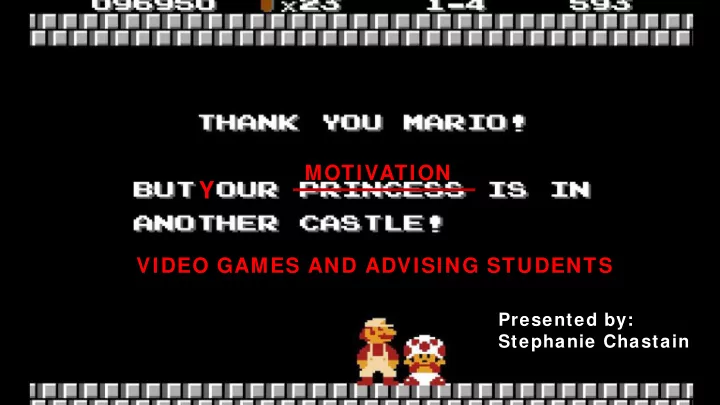

MOTIVATION Y VIDEO GAMES AND ADVISING STUDENTS Presented by: Stephanie Chastain
Choosing Your Character Current Previous • Academic Advisor for the • GA for Supplemental Instruction Department of Computer Science • UNIV 101L Instructor • FYS Instructor • EMU Alumnus – HESA program • Completing second master’s in • WSU Alumnus – Psychology Honors Educational Psychology • SI Leader and Peer Mentor • Part-time gamer
Understanding Your Mission Motivation • Examine • Identify relevance commonalities • Contrast types • Define self-efficacy • Design XP bar • Recognize skill trees • Translate • Apply techniques conversation topics Video College Games
Why Video Games? 56% of players are between the ages of one and 35 years old 4 out of 5 U.S. households own a 155 million device used to play video games Americans play video games 51% of U.S. households own a dedicated game console
Game Types • Action, Shooter, • Adventure, RPG, • Simulation, Strategy, • Sports, Racing • Linear vs. Open • Skill trees (permanent)
Video Game Summary • More than half of Americans play video games • RPG/Action/Adventure • Open World Concept vs. Linear • Skill/Ability Trees • Customizable player attributes What motivates a player to continue when the challenge appears too great?
Self Efficacy and Motivation Physiological factors • Anxiety: normal or lack of ability? Social persuasion • Encouragement from peers, professors, advisors, family Vicarious experience • Modeling: if they can do it, I can do it as well Performance accomplishment • Experiencing success or mastery
Video Games and Motivation • Thinking that sweaty palms and anxiety over a boss fight are normal reactions and feelings. • Your best friend reassuring you that you will win this time. • Reviewing YouTube videos that walk players like you through difficult levels. • Finally defeating your opponent and completing the mission. How can we translate these into a conversation about academic success?
Student Success Translations • How do you react when you cannot win a boss fight in a video game? • Then ask: How can you use that thought process for your next math exam? • What do you do when you are not sure how to complete a mission? • Then ask: Is there a similar resource available to you for your English paper? Students have the skills to succeed in their video games, why aren’t they applying the same techniques to their classes?
Examining Differences College Skills Player Skills • Exams/quizzes have required skills • Boss fights have required items, and knowledge for high scores weapons, and abilities to win • Abstract understanding of student • Tangible understanding of player level of knowledge via grades ability via skill trees • S1 Grade of A≠ S2 Grade of A • Dodge Move = Dodge Move Where is the XP bar (and equipment list) that shows a student is ready for a test?
Designing an Experience Bar • Each completed action provides a set amount of XP • Provides students with a concrete view of what is needed to master the skill • Utilizing students’ prior knowledge (and interest) of video games and relating it to obtaining study skills • Motivate students to self-assess their skills and determine how to make improvements
256 XP 1000 XP 5 more chapters and 7 more 744 XP to go lecture slides to before I’m ready review... for this exam!
Topic Options • Motivation and Organization • Increasing Concentration • Improving Note-taking • Test Taking Strategies • Textbook Reading Strategies • Coping with Test Anxiety • Exam Preparation • Time Management • Eliminating Procrastination • Stress Management
XP Bar in Practice • Advising appointments • Probation students (skill) • First year students (structure) • Academic Success Centers • Tutoring or SI sessions (content) • Success Coaching • First Year Seminar courses • FTIACs grew up with video games
Connecting Ideas and Experiences Video Game College/University • Customize character • Customize character • Appearance • Seek out place in the world • Choose starter skills and abilities • Make choices to develop sense of self • Navigating Open World Setting • Navigating Campus Setting • Side Missions • Side Missions • Develop character skills and abilities • Get involved on campus • Explore new areas • Join student organizations • Not required, but enhance experience • Build skills for academic success • Ultimate Goal • Ultimate Goal • Continue the story line until the game is • Choose a degree that leads to a career won that matches interests and values
Stephanie Chastain schastain@wayne.edu
Recommend
More recommend